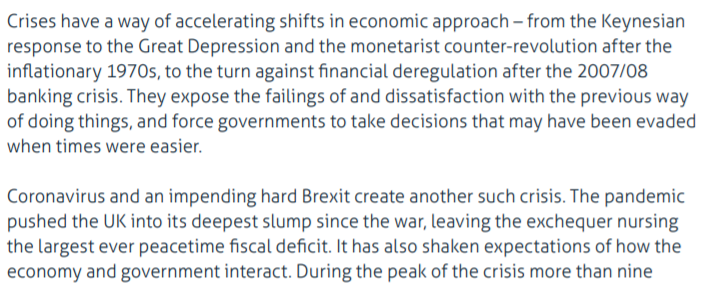
I spent six years in Government building the case for an Industrial Strategy, first with Vince Cable and then with Theresa May.
This report is my attempt to explain the thinking that needs to go into it 1/ instituteforgovernment.org.uk/sites/default/…
This report is my attempt to explain the thinking that needs to go into it 1/ instituteforgovernment.org.uk/sites/default/…
First, you need to pick your moment - but the moment can last years. Peter Mandelson and @vincecable each recognised that post Financial Crisis was the time to build the case for intervention that changes the way the economy works. Now is another such time 2/ 

Let's face it: Johnson has always sounded like someone who ought to like Industrial Strategy, even if his "boosterish can-do-ism" largely focuses on concerns that other politicians going back to @Ed_Miliband have expressed 3/ 

And Brexit will be a painful reminder that as a country we need to learn to focus on what we do best - whatever that is 4/ 

My major beef, echoing the formulation of Professor @rodrikdani, is with the HOW not the WHY of industrial strategy. Pointing to a shiny future of better jobs, fuelled by science, a green transformation and better infrastructure - that is the easy bit! HOW will you do it? 5/
And I feel that the signs under Johnson - and Cummings in particular - were not good. Sheer weight of infrastructure spending doesn't transform economies. Science-obsessed dilettantes picking cutting edge sectors from Whitehall hasn't worked 6/ 

So, as another such politically-appointed Industrial Strategy dilettante, what are my recommendations for a successful approach? There are many, but if they could be summarised in a tweet - don't exclude the sceptical thinking of @hmtreasury when you do it! 7/
The Treasury is the guardian of key economic virtues in government, in particular defence of competition, and an all-round wise scepticism and belief in markets (which you can read in gov.uk/government/spe… by @nickmacpherson2) 8/
Just as important: HAVE EDGES around your industrial strategy. You need to have a reason to say you are intervening here and not there. An inability to provide that reason is proof that you don't really have a methodology underpinning your approach 9/ 

Over 2017-2019, the government showed a failure to create 'edges' in its Sector Deal policy: it was open all comers. That is not strategic. And it meant whatever was done was under-resourced 10/ 



So choose some criteria on which you are intervening. It isn't rocket science*. Is the sector big enough? Likely to face significant structural reform? And, crucially, can the government make a difference with its conscious intervention?
*though it can include rocket science 11/
*though it can include rocket science 11/

Another rule: focus on institutions. That means structures that change the incentives of the agents in the economy that do the actual delivery of economic outcomes. You don't lift up an economy with direct government action, but by influencing how the private sector works 12/ 

Another negative, and a real bugbear of mine: industrial strategy is NOT TECH CHAMPION CREATION POLICY. Rows of Tory advisers going back to Cameron have acted like good economic policy EQUALS creation of a venture capital hit based on tech. It. Isn't. 13/
It is easy to imagine why people think messing with the science budget = the significant bit of industrial strategy. Technological change drives long term growth. But the real benefit of innovative change occurs in its USE. Very influenced by work of @Nightingale_P here 14/ 



And learn to love your constraints. If a system like State Aid is forcing you to subject your interventionist idea to more checks, it is probably improving the policy, and preventing moronic behaviour like the sort this MP wanted: 15/ 

Finally, the point of all this scepticism: when you know that you are right to intervene, COMMIT. Be lumpy - but with well-chosen lumps 16/ 

Anyway, thanks to @gemmatetlow for suggesting I write it, and all the help from numerous readers. I realise I have barely scratched the surface, and need to do more work on what building the right institutions etc looks like. Maybe in 2021. Maybe ... /ends
Oh, and here for those who made it through the thread is the link to the landing page again instituteforgovernment.org.uk/publications/i…
• • •
Missing some Tweet in this thread? You can try to
force a refresh









